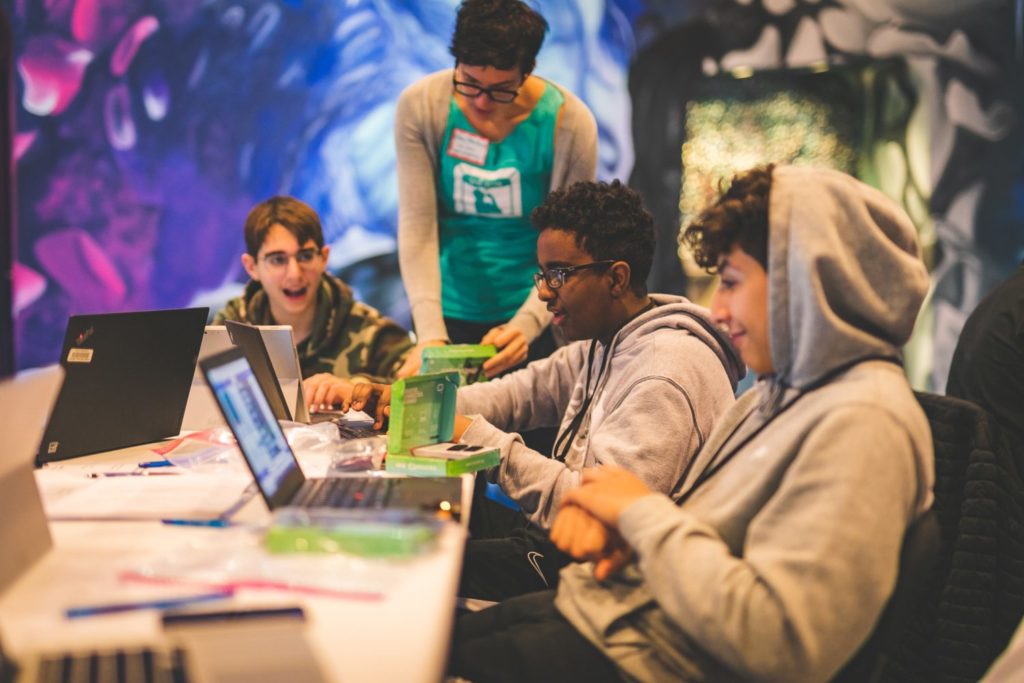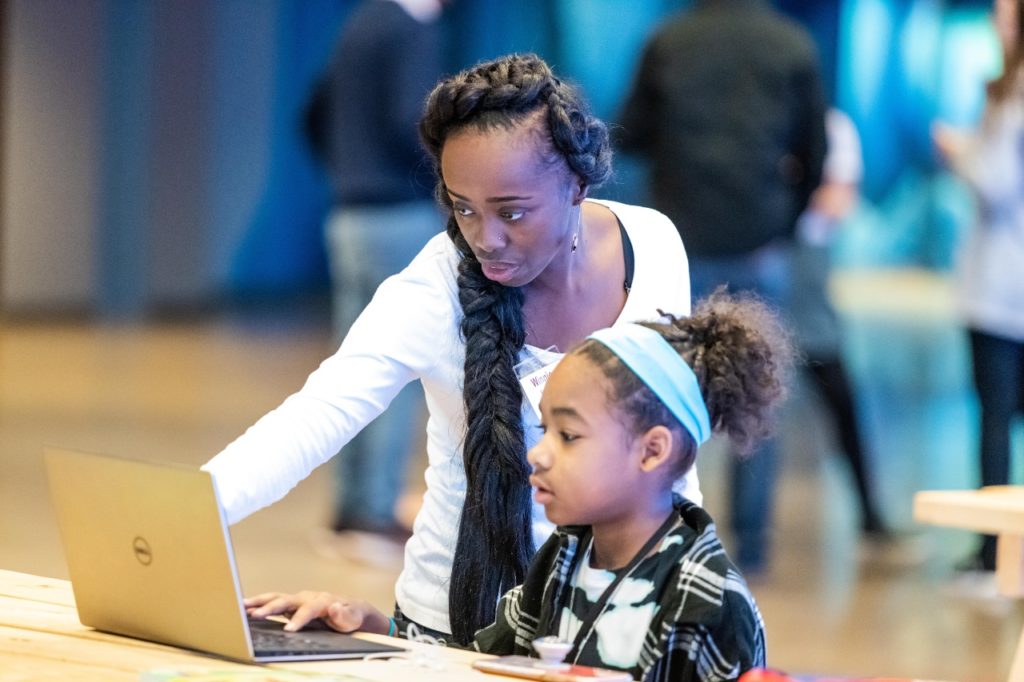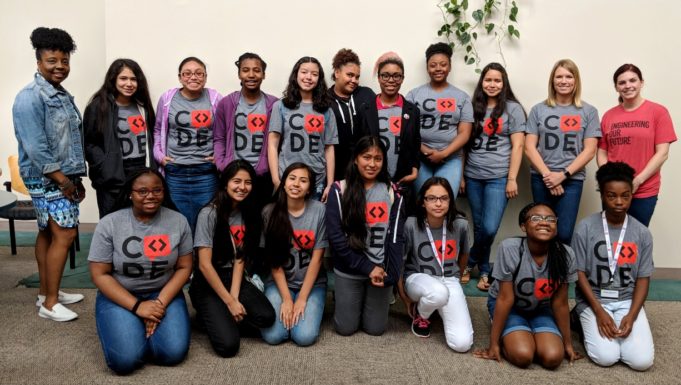“I was seeing the growth of the jobs in the [technology] field, and the fact that an average salary in computing is like $75,000, and the fact that students just really were not having access to these opportunities, or by the time that they would have access to something like this maybe in high school, they would already have sort of self-selected or self-filtered out of this being a possibility for them,” said Winnie Karanja, founder and executive director of Maydm. “So that’s really what I wanted to change.”
The local non-profit began back in 2015 after Karanja engaged in a conversation with former Falk Elementary School Principal Grace Okoli.
“[Okoli] mentioned how she reached out to a national nonprofit to teach your students how to code, and she never heard back. I was really distraught by that,” Karanja explained. “Initially, I was like, ‘I can teach your students how to code’ and then I said, ‘well, wait a minute, let’s see what already exists out there.’ And I couldn’t find something that would cater to the needs of underrepresented communities in the field.
“It’s a problem that our tech and engineering departments are majority white men,” Karanja continued. “How are they going to build products for people of color and for the whole rest of the community if we only have one perspective or just very limited perspectives in terms of experiences?”
At the time of Maydm’s inception, “three to four percent of the technical workforce in the U.S. was composed of folks who are Black or Latino, and then 22 percent was comprised of women,” Karanja noted.
Unfortunately, those numbers have remained stagnant, with the number of women currently in the technical workforce at about 21 percent. “And in Dane County, I knew these stats didn’t look any different. They probably look worse,” she added.
With those inequalities in mind, Karnaja hoped to mitigate the disproportionality by offering technical training and exposure to girls and youth of color through a variety of after- and out-of-school programs.
“I think the thing for me is that I really want to believe that this is one of the most significant ways in which we can address a lot of the inequalities in our community — by making sure that students have access to these skills and opportunities in the sector that has one of the lowest unemployment rates, the sector that right now is enabling so many people to work remotely right now,” Karanja said.
Madym’s beginning was not without its challenges. Karanja had never run a non-profit, which made starting up a little difficult. However, at the end 2017, Maydm had launched their first large-scale event — Circuits, Cards, and Code, which allowed 100 middle and high school students to learn about electronic engineering.
The strides made by Maydm could not have been possible without the initial financial support from Zendesk Neighborhood Foundation, which funded their early operations.
Maydm also received funding from CUNA Mutual Group, which is now their largest corporate sponsor.
“Every year they’ve increased their commitment to Maydm and not just financially –financially is very important — but just their involvement with the mentors, their involvement with opening up their space, and their involvement of wanting to come alongside us to scale the work that we’re doing, and truly like putting their dollars, their time, and their resources towards not just talking about wanting to envision something different for our community, but really bringing it together,” Karanja said. “And as we launch some things going into the new year, my hope [for] the next five years of Maydm and more is to have strong partnerships that look like the one we have with CUNA.”
Currently, Maydm has 13 organizational partners.

Maydm continued to grow and by 2018, they had increased their outreach beyond Dane county into Milwaukee.
“There’s a lot of potential in Milwaukee. There’s a lot of untapped potential. I think there’s a lot of ability to connect students to companies and you have a lot of companies that are really committed to the community,” Karanja explained. “The population, to me, aligns with Maydm’s focus demographics and the change we want to see and there are companies that are moving from being manufacturing companies to being tech companies and they need a workforce. There’s a really strong opportunity there to really hire from locally trained [people] and be able to grow that and again change that narrative of who belongs in STEM and then change who has access to what.
“There’s a kind of difference that Maydm can make in Madison and that difference is amplified in Milwaukee,” she added.
Calley Mannion, Maydm’s Grants and Communications Lead, said that Maydm’s success lies in the accomplishments of their students.
“A lot of our success stories look like students who started in middle school with us, grew into high school, and we’re seeing them get fives on their AP Computer Science exams, and we’re seeing them winning the [Early College] STEM Academy,” Mannion said. “One of our students is now a sophomore at Williams College and she’s studying computer science and she’s a TA for an introductory computer science class.”
In Maydm’s third quarter 2020 video message, one student noted her own experience with one of Maydm’s programs.
“It made me feel happy that I was actually doing something that I wanted to do, and it made me feel good that there were other people that wanted to do it too,” the student said.
“The work we do, there is short-term impact, but a lot of it is [for] the long-term impact,” Karanja said. “A lot of it is seeing our students go into two-year colleges, four-year colleges, getting into the workforce. So within the past five years, now we’re seeing some of our students in college. Some of them are going to school and working part-time.”
Due to the pandemic, Maydm’s teaching model shifted from offering in-person to online programs. However, Mannion noted that the pandemic helped remind the staff of their original goal “to make space for [students] to have community.”
“It kind of brought us back and reminded us how we serve our students in the ways that they need to be served. And like, how do we create the experiences that they need right now.”

This year, the Maydm team nominated Karanja for Forbes’ 30 under 30. In September of 2020, she was selected to be part of the 2020 class.
“But that’s something that I was always just super humbled by that my team would think so much about the work that we’re doing to be able to pay me for that and then also for Forbes to say this is really important work, out of the like whatever 20,000 people who applied,” Karanja said.
Looking forward, Maydm is hoping for another five years of success and service.
“I think what’s next for us — a lot of just expanding and deepening the programs that we’ve found to be successful, our immersive summer program [and] launching a number of initiatives for high schoolers,” Karanja noted. “…So I think these next five years is part of an even bigger place of seeing the main Maydm mission actualized.”




























